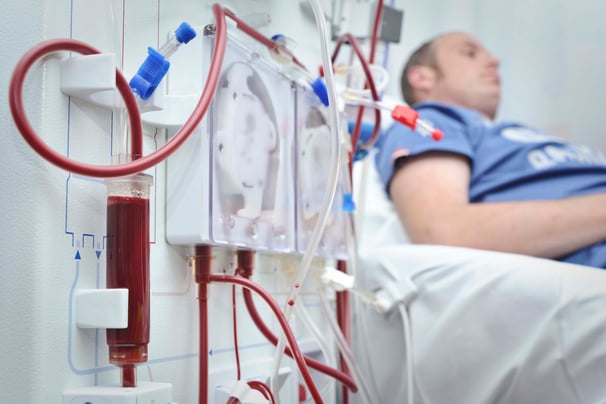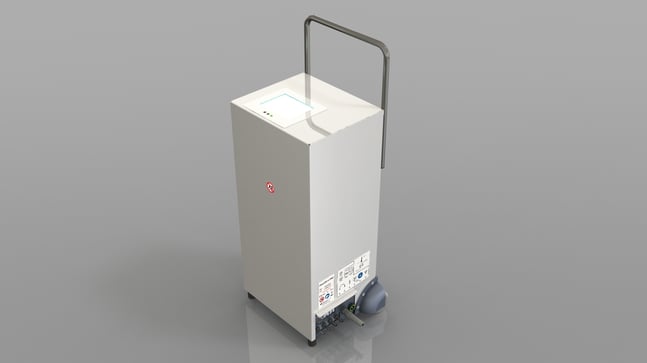With hospital facilities and resources under increasing pressure, flexible treatment options are essential, especially for patients who require regular treatment, such as those on dialysis. Our HemoRO 4 ONE reverse osmosis water system offers an easy-to-use and mobile option for the supply of pure water to dialysis machines in ICUs and or patients’ homes.
The Challenge of Traditional Dialysis Treatment
While haemodialysis is an essential and lifesaving treatment for patients with renal issues, the process can be significantly confining and inconvenient. It requires patients to spend 3-4 hours connected to a machine, typically three times per week. This rigid schedule often disrupts work, family life, and social activities, leading to reduced quality of life and psychological stress.
Critical Water Quality Requirements for Dialysis

One of the most critical operational challenges of dialysis is the need for significant volumes of reliable, ultra-pure water to be supplied to dialysis machines. According to the CDC, a patient will typically require 300-600 litres per week. The water used must meet the strictest pharmaceutical-grade standards, as it comes into direct contact with the patient's blood through the dialyser membrane. Contaminants such as bacteria, endotoxins, heavy metals, chlorine, or chemical disinfectants can cause severe complications, thus necessitating sophisticated water treatment systems.
There is a range of sophisticated technological options available for the production of ultra-pure water that meets the stringent required standards of less than 0.1 CFU/mL of bacteria and 0.03 EU/mL of endotoxins, as specified by international guidelines, including ISO 11663 and AAMI standards. These water treatment systems typically employ a multi-barrier approach combining several purification technologies in sequence. Primary treatment often begins with pre-filtration and chlorine removal through activated carbon, followed by reverse osmosis (RO) systems that remove dissolved solids, organic compounds, and microorganisms. Secondary polishing steps may include electrodeionisation (EDI), mixed-bed deionisation, or additional RO passes to achieve the required conductivity levels.
The Increase of Home Dialysis Solutions
There is an increased appeal for dialysis patients to have their treatment at home, a trend that accelerated during the COVID-19 pandemic and has continued as patients and healthcare systems recognise the benefits of decentralised care. This shift reflects both patient preferences for greater autonomy and healthcare system recognition of the advantages of reducing hospital burden. The challenge of ensuring a reliable supply of treated water remains.
HemoRO 4 ONE: Mobile Water Purification Solution

Our compact and mobile HemoRO 4 ONE unit can be connected directly to the mains water supply in the patient’s home to deliver pure water that meets the stringent standards for dialysis water set out in BS EN 60601-1-11:2015. Key features include:
- Quick installation and operation in just 10 minutes
- Easy configuration via the coloured 5.7" touchscreen
- Delivers up to 70 l/h of pure water
- Internal heat disinfection function capable of temperatures above 80°C for highest microbial purity
- Engineered for quiet operation to minimise disturbance and create a restful environment
Furthermore, for patients receiving dialysis in the hospital, mobile systems allow treatment to be carried out in the best location for the patients and staff, whether that is in an intensive care unit, private room or a separate dedicated area. The system’s compact, lightweight and portable design means it is easy to move around using the built-in wheels. The robust aluminium housing protects the system and resists scuffs and knocks when in transit.
Although it is an essential and lifesaving process for many patients, dialysis does not necessarily need to be carried out within a hospital setting, providing a reliable supply of purified water can be achieved. Allowing patients to receive dialysis in their own home not only has benefits for their quality of life and health but also takes pressure off hospital facilities and staff at the busiest times.
At Veolia, our expertise and experience in the design and implementation of purified water systems for healthcare means we are able to guide the solution that best meets the needs of the hospital and its patients.
Click to find out more about the HemoRO 4 ONE.